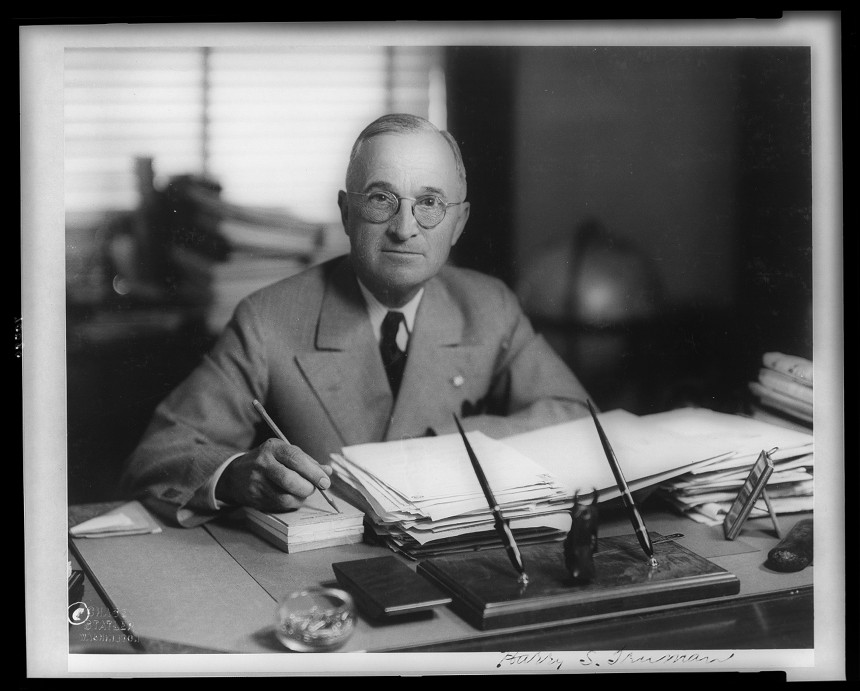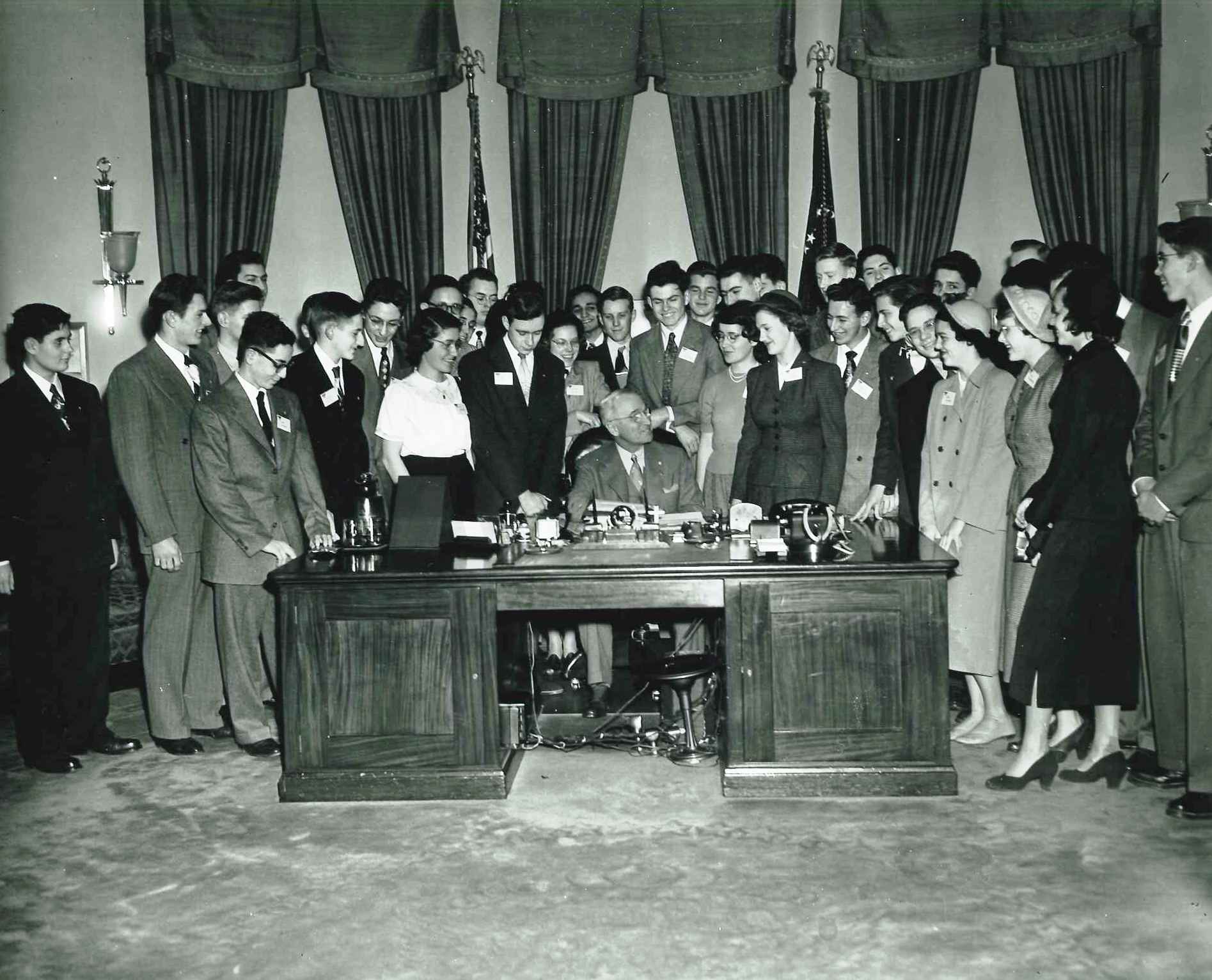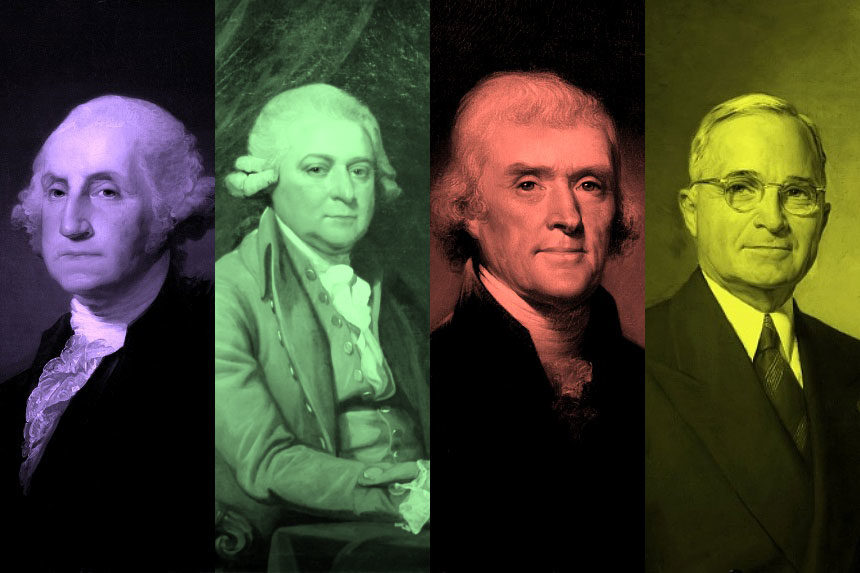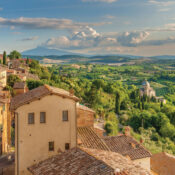Harry Truman is not the first president who comes to mind when you think of the Fourth of July.
There is George Washington, of course, although he was off fighting the British on the day of the historical adoption and signing of The Declaration of Independence. John Adams, second president of the United States was there, in Philadelphia, a principal participant in the Second Continental Congress. And, of course, Thomas Jefferson was the principal writer of The Declaration of Independence, which was formally voted on and approved July 4, 1776.
To my surprise, almost as much as yours, I offer the name of the 33rd president of the United States, Harry S. Truman.
As I think back on it, our student press conference with him in 1946 is what the John Philip Sousa marches and the sprays of red, pink, and silver star-like fireworks in the sky celebrate each year.
It begins, in a way, with an incident at the Chicago Theatre in October 1944. I was a junior in the Medill School of Journalism at Northwestern University hoping to get an interview with singer Lena Horne, who was appearing there that week. The man at the stage door said I would have to ask her manager. I could wait for him to come down from the floor of dressing rooms above.
Her manager was a heavy-set man, tie loosened and shirt collar open, the stub of a cigar in one corner of his mouth. I asked. He took the cigar from his mouth, flicked it, and said, “Honey, if I let you interview her, I have to let a hundred other school editors interview her.” He did allow me to stand in the wings and watch the show, which I wrote about in a nicely featured story.
I might have done other stories for the Northwestern Daily, but my father had a heart attack, and I had to leave school. The experience of being a student trying to get an interview stayed with me, however. Especially when I got a job as a copygirl at the Chicago Daily News and saw how easy it was for reporters and columnists there.
So, a year later, when I was given an opportunity to write a column for high school and college students, I proposed that the Daily News sponsor a press club of student editors. I would set up the press conferences, the students would get experience meeting and interviewing prominent people who came to town, and their stories would appear in the school papers for other students to read. (A nice change from the usual reports on high school assembly speakers who warned against drinking alcohol lest it pickle your brain.)
And … it came to pass.
Our first interview was with the veteran movie actor Pat O’Brien. We had so few students then we met in the sitting room of his suite at the Ambassador East Hotel. We had a couple more interviews and a few more students added the second month, and I was working on a press conference with Big Band leader Tommy Dorsey when I heard President Truman would be coming to town.
The president of the United States?
It was an audacious thought.
He did fit the profile, though. A prominent person the students could not interview otherwise. So I didn’t dismiss it out of hand. But … I hesitated. Could we really, really get a press conference with the president of the United States? After several days of wondering, working up my courage, I raised the possibility with my new boss, the features editor, who upon hearing my idea said, “Honey, go out and buy yourself an ice cream cone.” After a moment, the more professional response: “You just don’t get interviews with the President of the United States.”
“Why not?” I look back with some amazement at how offended I was.
With a certain, authoritative, knew-what-he-was talking-about emphasis: “No time. Have you ever seen a presidential schedule on an out-of-town trip?”
Nineteen myself at that time and feeling something I hadn’t expected to, I said, “That’s the trouble. Everybody’s always talking about how important young people are, hope of the nation and all that, but nobody has any time for them.”
I also pointed out that was the whole purpose of the press club: to set up interviews with people the students couldn’t get otherwise. I threw in some more comments about how important young people were.
He said, as much to end it as anything hopeful — helped a bit when the phone rang — “Okay. Give me a memo on it.”
My belief in the importance of such a press conference was put on paper, and grew as I did so. Careful to marshal my facts, I worked on it for more than an hour, trying to set out the reasons. That the students who attended would represent some 250,000 students in the Greater Chicago area. Students who would read the stories in their school newspapers. And that it was important for the president to show they were important. I think I again fell back on “hope of the nation,” and “future of the country.”
After reading it over several times, I left the memo on his desk.
I learned later he sent it on to the managing editor, who sent it down to Washington to the Daily News bureau chief, who sent it over to the White House, where Charles Ross, the Press Secretary, sent it in to President Truman. The president apparently liked the idea and agreed to meet with the students.
There was to be no public announcement, though. So it was set up amidst great secrecy. Letters went out from the managing editor to the principals of the public, private, and Catholic high schools in the Greater Chicago area, and their counterparts at the junior colleges, colleges, and universities, noting the students they selected — we still only had students from some 30 or so high schools — were not to be told who they would interview. Just to save the morning of Saturday, April 6, 1946, for a special press conference.
And so it was that on the morning of Friday, April 5, students throughout Chicagoland were called to the principal’s office and told they would interview the president of the United States the following morning. They were to go that afternoon to the Chicago Daily News Building to be briefed on the press conference.
Secret Service did not want to have to worry about being sure some 100 students got through police lines around the Blackstone Hotel the next morning, so it had been agreed the students would meet at the Daily New Building and a bus would take them to the hotel. One girl, Betty Gordon of Herzl Junior College, came up to me as the briefing ended to say she was an Orthodox Jew and could not travel on Saturdays. Her parents had booked a room for her at the Congress Hotel, and she would walk the three blocks or so down to the Blackstone. Would that be okay? I said we’d tell the Secret Service man we were working with, which we did. He said he’d have his people alerted to watch for her.
It was a great relief to see her in the meeting room down the corridor from the Blackstone Hotel ballroom the next morning when I looked around. The students were dressed in their Sunday best. The girls were wearing hats and the guys were in suits and ties. And they clutched their notebooks, pencils at the ready. Outside, two M.P.’s guarded the door, one on each side. This was for our student editors. No one else.
I had a place at the head table. And waited with everyone else, until we heard a stir outside, and then President Truman appeared in the doorway. He strode down the aisle by the paneled wall, that brisk walk so familiar to Americans from newsreels and photos of his daily walks. He stopped at the table to my immediate left. White House Press Secretary Charles Ross stood next to him and addressed the students, who were still standing.
The press conference would be conducted — as we’d briefed them the day before — under White House procedures. No quoting the president directly. He didn’t say, “It’s a beautiful day.” He said that it was a beautiful day. And we only had 10 minutes, presidential schedules being as tight as the features editor had said.

Everyone sat down … except the president, who remained standing as he faced the rows of young editors. I don’t remember most of the questions, just that they were serious, and appropriate. One about the United Nations. Another about a policy. One student, aware of how critical Congresswoman Clare Boothe Luce was of the president, asked: “What do you think of women in Congress?” The president’s answer was more in his expression than his words that he thought they were fine.
The one I do remember was a boy who stood and, as many of the students did, read the question on his notepad. He had, however, added to it as he thought of other aspects … to the point that, with an occasional pause for breath, it went on and on until you didn’t know what he’d started to ask. When he stopped, all the students heads turned from him — in unison, as if they were at a tennis match — to the President. What in heaven’s name would he — could he — say?
“Obviously,” he said.
The president more than doubled the allotted time, ignoring Charles Ross’s obvious glances at his watch, until he could ignore him no more. He thanked the students and thanked me, shaking my hand as he said what good questions they’d asked. And with that, he was gone. I learned later that when he stepped outside where the regular White House press corps was waiting, he told them it was one of the stiffest press conferences he’d ever had, and they could take a few lessons from the kids.

Back inside, the students rushed up to me, excited (agog, in some cases) over my having shaken hands with the president of the United States. My right hand became a thing of some wonder. I remember one girl exclaiming, “How can you ever bear to wash it?!”
The Daily News promotion department, after a lengthy search, could find no record of a president ever having granted a group of student editors a formal press conference before. Presidents had met with students, at the White House or when traveling or campaigning, but none had ever met with them at a formal press conference. And I’ve never heard of one since.
The press conference turned out to be a milestone in my career.
But it’s what happened the next day that prompts me to share the story as part of marking the Fourth of July.
I received a call from the city desk editor on duty that Sunday afternoon saying the story was still moving on the wires; specifically, Betty Gordon’s question about the poll tax. Political pundits were taking the President’s answer to mean he wouldn’t run in 1948. Would I come in and do a follow-up story on how the kids felt after they’d had time to absorb it, the momentousness of the occasion.
That’s when I discovered that several of the students had been asked to write stories about the press conference when they came out of the meeting room. One was for the Associated Press, and Marion Bradley of Sullivan High School said she received kudos from the AP editors in New York when they received her story.
When I called student Peter Langer for my follow-up story, his mother said he wasn’t home. He and his sister had gone to the movies. She would have him call when he came home. But she did not sign off.
Instead, she said, “I would like to say something.” A hesitant pause, as I waited.
“I feel rather proud,” she said, her words coming slowly, showing a distinct accent.
I felt it through the telephone.
“I feel especially proud because we have not long been in this country. We came from Austria — Vienna — about six years ago. It is so different. You would never have had a chance to see and talk to the president over there, so I’m especially proud.”
She’d found her voice now.
“We are so proud,” she said.
“Our son … asked the president of the United States a question … and got an answer. That could never happen in our country,” she said. Awe in her voice now, “Only in America.
“Only in America.”
Featured image: U.S. Presidents George Washington (Clark Art Institute), John Adams (Wikimedia Commons), Thomas Jefferson (WhiteHouse.org) and Harry Truman (White House Historical Association)
Become a Saturday Evening Post member and enjoy unlimited access. Subscribe now




Comments
What a wonderful article! Did you know that post World War II, when President Truman became aware that in the DP camps housing both Non-Jews and Jewish survivors, the Jews were getting severely picked on by the non-Jewish occupants ?–It may have been Eisenhower who alerted Truman, but it was Truman who gave the Jews their own camps. He changed the population of selected camps to contain only Jews — that they might at last find peace. There were weddings every week, often using the same wedding dress, as the prisoners sought to live again, and to celebrate the increase of the camp’s Jewish population barely more than a year later. General Eisenhower was also very supportive of the former Jewish prisoners, but Truman wanted to give them Palestine also.
I am currently writing a book about Aristides de Sousa Mendes and Antonio Salazar in World War II, and have already written and self-published two other books on the Holocaust for use in our Holocaust Center (The Holocaust Memorial and Tolerance Center of Nassau County in Glen Cove, NY.
What a wonderful article. Did you know that post worldwar II, when the survivors were assigned to DP camps, President Truman became aware that the camps housed both Non-Jews and Jewish survivors, and the Jews were getting picked on… It was he who changed the population of the camps for Jews to contain only Jews so that they might at last find peace. I swear that there were weddings every week as the prisoners sought to live again, and to celebrate the increase of the Jewish population barely more than a year later.
You never cease to amaze me, Val. Being the right young woman in the right place at the right time, knowing what to say and when to say it. I’m very proud of you, even if it is retroactively. You don’t mind, right?
This had never happened before or since, and it’s all because of you. It likely helped pave the way for good things that came along later, and still to come. We need a woman President, Val. Someone with your intelligence, common sense, determination for the common good of all Americans, and knows the tricks of the trade in getting it accomplished. I’m nominating you, right here, today, in this column. Happy 4th of July weekend!